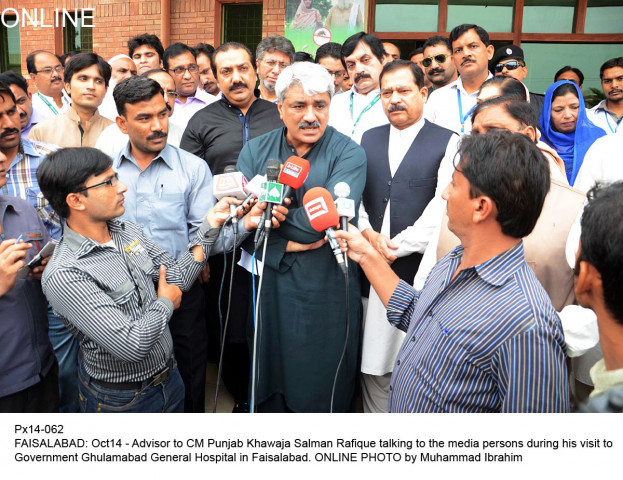Crucial weeks: ‘Mosquito breeding threat still on
Salman Rafiq says dengue mosquitoes might venture indoors

Adviser to Chief Minister on Health Khawaja Salman Rafiq said on Tuesday that the next two or three weeks were very important for dengue mosquito breeding.
He said that due to a change in weather, dengue larvae was being reported outdoors.
He said it was feared that the dengue mosquito might move indoors and find breeding spaces there. He said dengue surveillance should be stepped up. He said all government departments should continue to take steps for eradication of dengue mosquito.
Rafiq was presiding over a Cabinet Committee on Eradication of Dengue meeting. District Coordination Officer Captain (r) Muhammad Usman, Health EDO Zulfiqar Ali and Vector Borne Diseases Additional Director General Islam Zafar also attended the meeting.
Zafar said currently as many as 113 dengue patients were being treated at various public hospitals in Lahore and Rawalpindi. He said Rawalpindi had been badly affected by dengue fever this year.He said the situation in Lahore and Sheikhupura were under control.
Usman told the meeting that targeted fogging and indoor spraying was done according to guidelines provided to the district administration,
He said case response was also being ensured at houses of dengue patients.
Preventing an Ebola outbreak
Rafiq said that the government would take all possible steps to check an outbreak of Ebola virus in the province.
He said the guidelines provided by the World Health Organisation (WHO) and medical experts would be followed in this regard.
He was presiding over a meeting held to review government’s arrangements in the face of a possible Ebola outbreak at Services Institute of Medical Sciences.
Health Services Director General Zahid Pervaiz, SIMS Principal Hamid Mehmood Butt, Health Director (CDC) Ahmed Afifi, Services Hospital Medical Superintendent Captain (R) Muhammad Zafar and Services Hospital emergency director Muhammad Ashraf attended the meeting.
Participants of the meeting were told that Ebola was a disease in which 70 to 80 per cent mortality rate had been recorded. It was said that Ebola virus had originated from African countries.
Officials were urged to take steps to screen travellers, though it was believed that chances of the disease spreading in Pakistan were small.
Medical experts discussed in detail the arrangements regarding treatment of patients.
Dr Sobia Qazi said an Ebola patient should be kept in isolation for at least 21 days and doctors, nurses and other staff providing treatment should wear protective gear.
Pervaiz said the Health Department was following WHO guidelines to monitor the Ebola epidemic.
He said an ambulance of the Health Department would be deputed at Allama Iqbal
Published in The Express Tribune, October 22nd, 2014.



















COMMENTS
Comments are moderated and generally will be posted if they are on-topic and not abusive.
For more information, please see our Comments FAQ